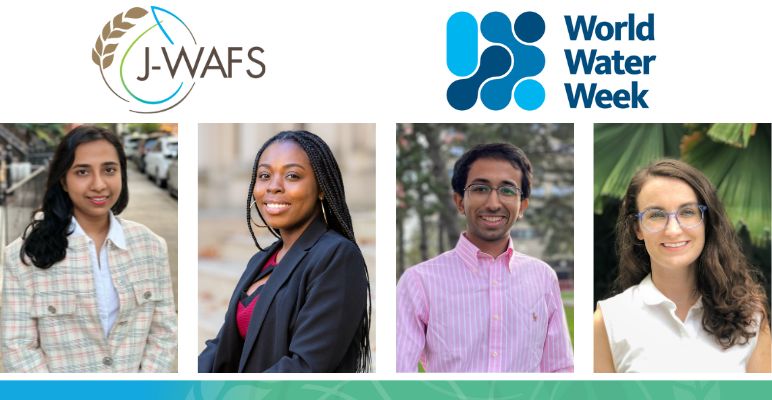News J-WAFS announces 2023 Travel Grantees to attend Stockholm World Water Week
Four outstanding MIT graduate students will receive funding to attend the water conference in Sweden this August.
Carolyn Blais June 8, 2023

This year J-WAFS is offering travel grants for MIT graduate students to attend one of two major upcoming water sector conferences: Stockholm World Water Week in August and the UNC Water & Health Conference in October. The call for applications for Stockholm World Water Week were due this past May. Today, J-WAFS is happy to announce that four outstanding students were selected to receive funding to attend the conference in Sweden:
- Smriti Bhaya, Master's student in the Department of Urban Studies and Planning
- Chyna Mays, PhD student in the Department of Biological Engineering
- Arjav Shah, PhD-MBA candidate in the Dept. of Chemical Engineering and the Sloan School of Management, respectively
- Lizzie Yarina, PhD candidate in the Department of Urban Studies and Planning
World Water Week is an international water conference where academics, NGOs, industry professionals, and government officials gather to discuss, share research, network, and learn about global water issues. This year’s conference is focused on innovation at a time of unprecedented challenges. The theme “Seeds of Change: Innovative Solutions for a Water-Wise World” invites participants to rethink how water is managed and asks which ideas, innovations, and governance systems will be needed in a more unstable and water scarce world.
The J-WAFS Travel Grant for Water Conferences is supported by Xylem Inc. and GoAigua, both J-WAFS Research Affiliates and water technology companies. Xylem is also a global sponsor of World Water Week, as well as the Stockholm Junior Water Prize, which is awarded during the event. The Travel Grant supports students’ travel, registration, accommodation, and meal expenses for the conference. Grantees are expected to attend sessions and panels of interest and to network with professionals and others in the water industry. Students will also be given the opportunity to engage with Xylem leaders and employees.
Learn more about each of the 2023 grantees below.
Smriti Bhaya
Smriti is interested in climate resiliency planning, focusing on water management and flood risk mitigation strategies for developing contexts. To this end, she has started a social venture called Purifyx, which provides low-cost grassroots solutions for clean drinking water in rural India. This summer she will be interning with the NYC Department of City Planning in their urban design division. Prior to MIT Smriti worked on architectural, urban design, and policy projects in India and has a bachelor’s degree in architecture from Kamla Raheja Vidyanidhi Institute of Architecture and Environmental Studies, Mumbai.
Chyna Mays
Under advisor Professor Angela Belcher, Chyna is engineering yeast to sequester salts and metal contaminants from mine tailings and other water systems. She hopes that her research will be a sustainable solution for reclaiming contaminated water for human and industrial use. Chyna is also a National Science Foundation Graduate Research Fellow and an Alfred P. Sloan Scholar. After receiving her Bachelor of Science in bioengineering from Stanford University, she decided to pursue research opportunities towards bioengineering organisms for environmental remediation.
Arjav Shah
Arjav combines principles of nanofluidics, polymer physics, and materials science. His research with Professor Patrick Doyle focuses on the nanopore fingerprinting of viruses in water samples for wastewater surveillance and cell therapy products for sterility testing. He is also part of Doyle's J-WAFS Solutions team, working to scale up and lead commercialization efforts of sustainable hydrogel microparticles for the removal of micropollutants from water. He is passionate about effective science communication and is involved with the MIT Communication Lab and MIT Science Policy Review.
Lizzie Yarina
Lizzie's dissertation investigates the spatial politics of climate change adaptation in Vietnam’s Mekong Delta region, an area facing many water challenges. She is presently co-editing a volume on the relationship between climate models and the built environment with a multi-disciplinary team of editors and contributors. Previously she was a research scientist at the MIT Urban Risk Lab, where she was part of a team examining alternatives to FEMA’s post-disaster housing systems and conducted research on disaster preparedness in Japan. She holds a joint Masters in Architecture and Masters of City Planning from MIT, and a B.S. in Architecture from the University of Michigan.